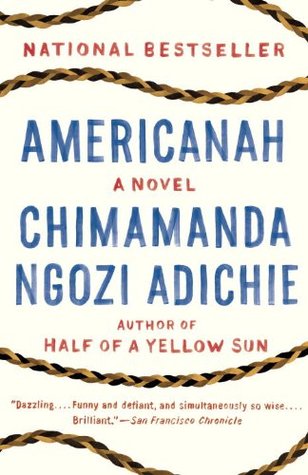 I liked this book.
I liked this book.
The main character is Ifemelu, a Nigerian woman who comes to America and then, many years later, decides to return to Nigeria. Through non-chronological storytelling including flashbacks, we follow her growth through childhood and adolescence in Nigeria, and then adulthood in America and back in Nigeria. While the driving narrative is the relationship between Ifemelu and her first love, Obinze, this book offers so much more than just a love story. It talks openly about race and immigration, and puts into perspective the first-world problems of America and the third-world problems of Nigeria.
So, I consider myself pretty well-informed on race issues in America. I am non-white, and I read a lot of articles and think pieces about race. From where I'm coming from, this book reiterated much of what I already understand about race, and I thought it was remarkable just how openly race was addressed. I once participated in an employer-sponsored race workshop, and it was not so much a discussion about race as it was a lot of dancing around the topic. I left feeling frustrated and annoyed, wanting to shout, "Let's just TALK already!" Compared to that workshop, I think a much more effective way to talk about race would be to require everyone to read this book and then have small book group type discussions led by those trained workshop leaders. For a person who has not yet given much thought to race, or who maybe doesn't know how to go about talking about it, this book offers much food for thought. If exploring race doesn't interest you, then this book is not for you.
Beyond race, this book did open my eyes to the struggling world of immigrants - both legal and illegal. Again, I consider myself pretty well-informed on immigration, and coming from an immigrant family myself, I think I have a pretty good understanding of the challenges faced by immigrants. But this book shined an additional light on the troubles faced specifically by illegal immigrants. I found myself invested in the characters' stories, and therefore rooted for them throughout the book, but I do wonder... Would a person who is politically unsympathetic to illegal immigrants be able to sympathize with these characters, or would they feel disgusted with them as illegal immigrants?
I got a little hung up at one point in the book, when Ifemelu changed her career in America. Her new career eventually required a whole slew of different skills and abilities that seemed uncharacteristic of what we knew of her before. It was just a little strange that she suddenly was capable of doing these things that she never did before. I also was disappointed that the book did not delve further into Dike's psyche. He was only a supporting character, but his experiences as a non-American black growing up being treated as an African-American black were valuable, and I constantly wanted to know more about him.
In the end - without giving away the ending - I felt not quite satisfied. It was not a tragic ending, but also not quite uplifting. I think it was an important part of the book that Ifemelu's sense of self was strong enough to withstand years of American influence - that she put herself in a position to learn much in America, and in the end, realized she only needed to be true to herself, no matter where she lived. It's a good message, but maybe she could have learned the same things in Nigeria? Of all the many characters in the book, only Ifemelu, Obinze, and maybe Iloba, remained fundamentally unchanged despite their time abroad - and that seemed a bit contrived, especially given how much everybody else had changed. The way events unfolded, I actually felt sadness and regret that she had "wasted" so many years in America, when her alternate life path - that she would have led if she had stayed in Nigeria - would probably have turned out just fine, maybe even better.


No comments:
Post a Comment